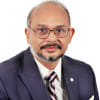
Rashed Al Mahmud Titumir
Dr Rashed Al Mahmud Titumir is professor in the Department of Development Studies at the University of Dhaka.
Dr Rashed Al Mahmud Titumir is professor in the Department of Development Studies at the University of Dhaka.
What the economy needs more than emergency repair is democratisation.
Urban density in Dhaka has surpassed the thresholds for safe air operations. Military and civil aviation now operate in a dangerously overlapping airspace.
The tripartite patronage of business, politics, and bureaucracy forms the bedrock of the oligarchic structure, where business elites fund political campaigns and gain legislative favours.
Pragmatic gradualism is the optimal way for achieving lasting reforms.
True reform must aim for devolution rather than centralisation, redistributing power downward before horizontally.
In the forthcoming 2025-26 budget, two pressing questions warrant urgent attention.
The debt burden can be reduced in the upcoming budget.
To honour the spirit of the July uprising, all political parties must commit to defining and institutionalising national interests.
What the economy needs more than emergency repair is democratisation.
Urban density in Dhaka has surpassed the thresholds for safe air operations. Military and civil aviation now operate in a dangerously overlapping airspace.
The tripartite patronage of business, politics, and bureaucracy forms the bedrock of the oligarchic structure, where business elites fund political campaigns and gain legislative favours.
Pragmatic gradualism is the optimal way for achieving lasting reforms.
True reform must aim for devolution rather than centralisation, redistributing power downward before horizontally.
In the forthcoming 2025-26 budget, two pressing questions warrant urgent attention.
The debt burden can be reduced in the upcoming budget.
To honour the spirit of the July uprising, all political parties must commit to defining and institutionalising national interests.
Our political system stifles democracy and holds back economic progress.
The current situation requires cooperation, institutional restructuring and free and fair elections.